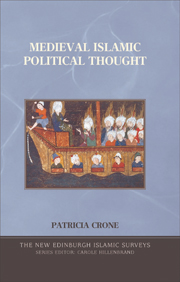Book contents
- Frontmatter
- Contents
- List of charts
- Preface
- Addenda and corrigenda
- I THE BEGINNINGS
- II THE WANING OF THE TRIBAL TRADITION, c. 700–900
- III COPING WITH A FRAGMENTED WORLD
- 12 INTRODUCTION
- 13 THE PERSIAN TRADITION AND ADVICE LITERATURE
- 14 THE GREEK TRADITION AND ‘POLITICAL SCIENCE’
- 15 THE ISMAILIS
- 16 THE SUNNIS
- IV GOVERNMENT AND SOCIETY
- Charts
- Bibliography, abbreviations, and conventions
- Index and glossary
12 - INTRODUCTION
from III - COPING WITH A FRAGMENTED WORLD
Published online by Cambridge University Press: 05 August 2013
- Frontmatter
- Contents
- List of charts
- Preface
- Addenda and corrigenda
- I THE BEGINNINGS
- II THE WANING OF THE TRIBAL TRADITION, c. 700–900
- III COPING WITH A FRAGMENTED WORLD
- 12 INTRODUCTION
- 13 THE PERSIAN TRADITION AND ADVICE LITERATURE
- 14 THE GREEK TRADITION AND ‘POLITICAL SCIENCE’
- 15 THE ISMAILIS
- 16 THE SUNNIS
- IV GOVERNMENT AND SOCIETY
- Charts
- Bibliography, abbreviations, and conventions
- Index and glossary
Summary
Of all the visions developed in the first two centuries it can be said that their starting point is monotheism in combination with the tribal conceptions of the Arab conquerors. By the tenth century, this was no longer the case. Back in the early days the Arabs were conquerors who set the cultural tone, and as it happened, the cultural traditions of the Syriac and Aramaic-speaking Jews and Christians who were their neighbours in Syria and Iraq blended imperceptibly with their own. The other native traditions, above all the Greek and the Persian, were not absent, but it was only after the Abbāsid revolution that they began to influence high cultural thinking on a major scale, and it was only in the tenth century that they acquired a dominant role.
The main topics of debate also changed. In the first two centuries, the key issue in political thought was tyranny and how to avoid it, whether by reducing the imam's power or on the contrary by sanctifying it. The debate reflected the relentless transformation of autonomous tribesmen into miserable subjects, which was all the more painful in that the victims were acutely conscious of what was happening to them and resisted with all the means at their disposal. By the end of the ninth century the transformation was a fait accompli. To most people, the ruler was now a remote figure, as inevitable, tyrannical, and uncontrollable as the weather with which he was sometimes compared.
- Type
- Chapter
- Information
- Medieval Islamic Political Thought , pp. 145 - 147Publisher: Edinburgh University PressPrint publication year: 2004



